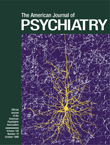Conjugal Loss and Syndromal Depression in a Sample of Elders Aged 70 Years or Older
Abstract
OBJECTIVE: The goal of this study was to describe the association between conjugal loss and both syndromal depression and depressive symptoms in a prospective cohort study of people aged 70 years or older. METHOD: A measure of syndromal depression, the short-form Composite International Diagnostic Interview (CIDI), and a revised version of the Center for Epidemiologic Studies—Depression Scale (CES-D Scale) were administered to a group of 5,449 elders in a longitudinal cohort study. The authors compared the rates of syndromal depression (CIDI diagnosis) and depressive symptoms (six CES-D Scale symptoms) in married participants and those who lost spouses between the first and second waves of assessment. RESULTS: The rate of syndromal depression in the newly bereaved was nearly nine times as high as the rate for married individuals, and the rate of depressive symptoms was nearly four times as high. The percentage of the bereaved respondents who had scores above threshold on the revised CES-D Scale was higher for those interviewed up to 2 years after loss of a spouse than for married respondents. Age, sex, prior psychiatric history, and the expectedness of the death did not differ between depressed and nondepressed newly bereaved subjects. CONCLUSIONS: Recent bereavement is a significant risk factor for syndromal depression in the elderly. Some widows and widowers experienced high levels of depressive symptoms up to 2 years after the loss of their spouses. Neither demographic variables nor variables concerning the nature of the spouse’s death predicted bereavement-related depression.



